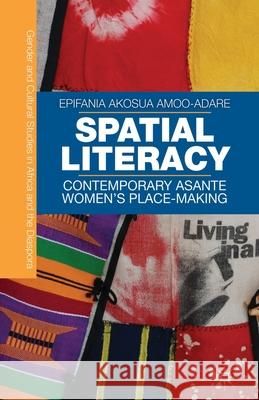Spatial Literacy: Contemporary Asante Women's Place-Making » książka



Spatial Literacy: Contemporary Asante Women's Place-Making
ISBN-13: 9781349448012 / Angielski / Miękka / 2013 / 173 str.
Spatial Literacy: Contemporary Asante Women's Place-Making
ISBN-13: 9781349448012 / Angielski / Miękka / 2013 / 173 str.
(netto: 117,60 VAT: 5%)
Najniższa cena z 30 dni: 115,63
ok. 30 dni roboczych.
Darmowa dostawa!
Revised version of the author's thesis (PhD)--UCLA, 2006.
"What Amoo-Adare brings to the literature is an intensely critical approach that is self-refl ective. Her identity informs the work and gives it urgency . . . Yet she is aware of her role as both insider and outsider, given her identity as a woman architect and scholar with African roots, a Western education and extensive travel in her adult life. She intentionally brings that hybrid identity into her analysis. By doing so, she gives readers a model for how to think about their own identities and trainings and how that affects their interpretation of urbanization in different parts of the world." - Jorunal of the American Planning Association
"In this compelling new book, Epifania Akosua Amoo-Adare offers a much-needed bottom-up analysis of urban space in Africa ... The author effectively balances advanced theory with richly detailed, insightful narratives that make the text accessible and essential for students, scholars, and practitioners alike." - Journal of the American Planning Association
"The coruscatingly pathbreaking and iconoclastic text opens up new approaches to our understanding of the relationship among space, scale, gender, pedagogy, and the coloniality of being. It is a must read." - Peter McLaren, Professor, Graduate School of Education and Information Studies, University of California, Los Angeles, and author of Che Guevara, Paulo Freire, and the Pedagogy of Liberation
"Drawing on her personal mobility and professional history as an architect with an Asante heritage, the author offers feminists, planners, architects, globalists, and Africanists a new way of conceptualizing race, class, sex, and culture through critical spatial literacy. She grounds the everyday lives of fifteen Asante women in Accra in their migration to the city where education, centrality of money and hard work, and pride in their identity brings to life a vibrant analysis about fluidity amid rapid urbanization and the need for a womanist politics of urban space." - Jacqueline Leavitt, Professor, Department of Urban and Regional Planning, Luskin School of Public Affairs, University of California, Los Angeles, USA
Critical Spatial Literacy is Urgent Political Praxis
Feminist Positionality: Renegade Architecture in a Certain Ambiguity
Politics of (post)Modern Space: Asante Women's Place in a Capitalist Spatiality
Auntie Pauline Sampene (Mobility)
Akwantu: Travel and the Making of RoadsAuntie Evelina Amoakohene (Education)
Anibuei: Civilization and the Opening of Eyes
Akosua Serwa Opoku-Bonsu (Economics)
Sikas?m: Money Matters and the Love of Gold
Nana Sarpoma (Asante Identity)
Process not State, Becoming not Being
Towards a Pedagogy of Critical Spatial Literacy
Epifania Akosua Amoo-Adare is a research specialist at Reach Out to Asia (ROTA), a non-profit organization affiliated with the Qatar Foundation. She has a PhD in Education from the University of California, Los Angeles and is a RIBA part II qualified architect, with over 26 years of experience working within the fields of education, international development, and social housing in countries like Afghanistan, Georgia, Ghana, Qatar, the United Kingdom, and the United States.
In this remarkable work of interdisciplinary scholarship, architect and scholar Epifania Akosua Amoo-Adare makes the case for an urgently needed praxis of critical spatial literacy, particularly for women of African descent. Through a compelling analysis of fifteen Asante women's negotiation of the politics of space, she demonstrates how they critically read the postmodern world in order to make place within it. This contains within it the promise of a feminist, 'renegade' architectural project in which spatial literacy allows one to navigate the significant socio-spatial effects of akwantu, anibuei ne sikas?m: travel, 'civilization,' and economics.
1997-2026 DolnySlask.com Agencja Internetowa
KrainaKsiazek.PL - Księgarnia Internetowa









